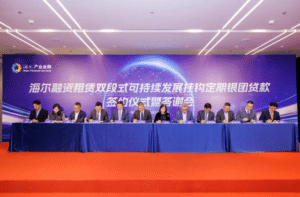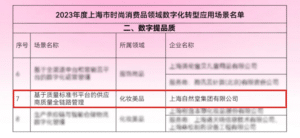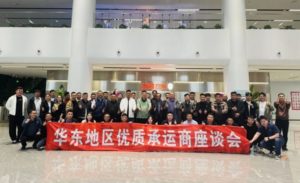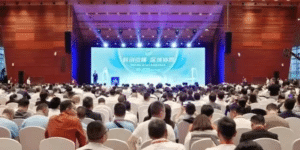The entry of AI will stir up major changes in the hundreds of billions of sleep industry
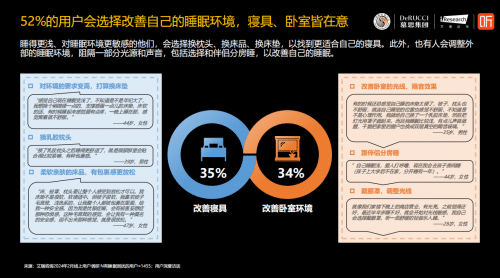
[ad_1]
In recent years, the concept of “relaxation” has swept across social platforms and has become the spiritual oasis that people are looking for in a fast-paced life. It symbolizes a leisurely, soothing and comfortable attitude towards life, and is the collective desire of modern people for inner peace, spiritual relaxation and improved quality of life. However, reality is often contrary to ideals. Although the public enthusiastically yearns for and actively practices “relaxation”, as night falls, many people are trapped in the dilemma of tossing and turning and unable to find deep sleep.
High-quality sleep seems to have become a luxury in modern society. Sleep disorders such as insomnia, excessive dreams, and easy awakening are becoming more and more common. They are like a mirror, reflecting the high pressure and imbalance of modern life. According to the “2024 Mood and Healthy Sleep White Paper” released by Mousse Group, China Sleep Association, iResearch Consulting, and Himalaya, 95% of the respondents have had health problems in the past year, and sleep problems ranked first among the five major health problems. . 50% of users choose to improve their sleep by finding bedding that is more suitable for them and adjusting their bedroom sleeping environment.
Faced with increasingly severe sleep health problems, the sleep industry has keenly captured market demand and launched an innovative revolution with bedding products as the core. This revolution is not only limited to the optimization and upgrading of traditional mattress materials and processes, but also the active exploration and widespread application of in-depth empowerment of technology.
The rise of smart mattresses is a clear example of this revolution. It subverts the single-function and fixed attributes of mattresses, introduces technology that can flexibly adjust hardness and height, and achieves a high degree of adaptability of mattresses to individual needs. Furthermore, some high-end products are even equipped with AI chips, which can not only remember the user’s sleep preferences and physiological parameters, but can even be linked with smart homes to proactively create a more comfortable sleeping environment for users. It can be said that technological progress, especially the deep integration of artificial intelligence and big data, is reshaping the core competitiveness of sleep products.
01. AI technology, a new outlet for the sleep industry
As modern people’s sleep problems become increasingly prominent and consumers’ demand for personalized and precise sleep solutions surges, the sleep industry market size is showing a strong growth trend. According to the latest statistics, by 2023, the size of China’s sleep market has exceeded the 200 billion yuan mark, and is expected to continue to maintain a double-digit annual growth rate in the next few years, with strong development momentum. This data also reflects the strong and continuing market demand for innovative products and technologies that effectively solve sleep problems.
Against this background, AI technology has quickly become the key to disrupting the sleep industry with its powerful data processing, personalized analysis and dynamic feedback capabilities. AI-powered smart mattresses can not only monitor the user’s sleep status in real time, such as key indicators such as sleep stage, heart rate, respiratory rate, number of turns, etc., but can also adjust mattress settings in real time based on these data, such as hardness, temperature, and support point distribution. etc., to adapt to the individual needs of users and proactively optimize sleep quality. This transformation from passive adaptation to active intervention marks the sleep industry entering a new era of precision and intelligence.
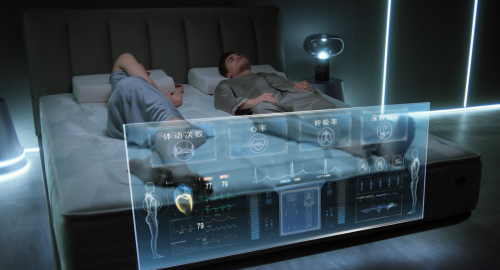
According to industry insiders, the reason why AI technology has become a new trend in the sleep industry is not only that it can fill the gaps in traditional mattresses in responding to individualized and complex sleep needs, but also that it conforms to the public’s deepening understanding of healthy sleep. With the trend of demand escalation and the market’s huge desire for innovative sleep solutions.
02. AI enters the market and meets a mattress that understands you better
According to industry insiders, the core of a truly intelligent sleep system is to use data analysis, biofeedback and artificial intelligence algorithms to deeply analyze and actively adapt to the user’s personalized sleep pattern, aiming to provide users with healthier and more restorative sleep. experience. An ideal smart mattress should have the ability to monitor the user’s sleep status in real time, including but not limited to key indicators such as sleep depth, breathing frequency, and number of turns, and intelligently adjust the mattress configuration accordingly to achieve dynamic optimization of sleep quality.
Understanding this trend, Mousse Group, which is deeply involved in the field of healthy sleep, proactively laid out smart mattresses as early as 2017, and officially established a smart sleep department in 2022, becoming the first in the industry to transform into a technology company and invest heavily in AI technology research and development. bedding brand. In the early days, due to technical bottlenecks, Mousse tried to place sensors on the surface of the mattress to obtain data. However, this caused users to feel an obvious foreign body sensation, affecting comfort. Now, after 7 years of technology iteration, Mousse has successfully developed a new generation of piezoelectric ceramic sensors that support non-inductive monitoring. By cleverly embedding the sensors deep into the mattress, it can accurately capture various sleep data while ensuring users’ sleeping comfort. .
The newly launched AI mattress T11 PRO by Mousse is a model equipped with this cutting-edge technology. It can keenly capture every subtle vibration of a sleeper, including heartbeat and blood flow, and convert it into electrical signals. It can accurately analyze this information through AI deep learning algorithms to achieve full tracking and interpretation of the user’s sleep status.
“The concept behind this technology is not complicated. The key is to use the physiological coupling relationship between the heart and the respiratory system. By comparing the interaction patterns between the electrocardiogram and the respiratory system, we can accurately obtain various data indicators that reflect the heart function.” Chen Wenze, vice president of Muse Group, explained this. This innovative application marks the successful introduction of such cutting-edge technology into the mattress industry and opens a new chapter in smart sleep.
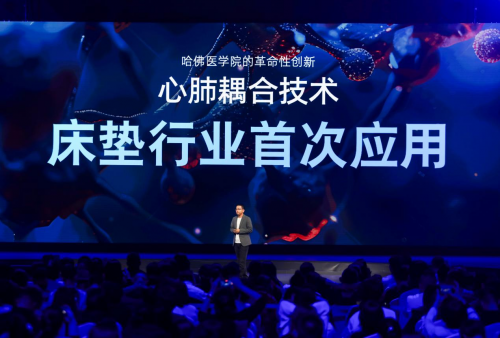
The integration of AI technology has brought unprecedented convenience to people who are extremely sensitive to sleep environment. In the past, improving the sleeping experience often required trial and error by changing pillows of different materials, increasing or decreasing the thickness of the bed, etc., to find the ideal sleeping posture. Nowadays, the 18 built-in flexible adjustment units of T11 PRO are like a customized sleep magician. They can respond in real time to every turn and every breath of the user, and accurately adjust the support strength and temperature to ensure that every time they turn over, they can enjoy the right amount of sleep. Customized comfort experience. Even partners sleeping on the same bed can each enjoy independent zone adjustment without interfering with each other, each getting what they need to achieve truly personalized sleep.
In addition, the Mousse AI mattress T11 PRO is also equipped with a “tidal algorithm”, which gives it the magical ability to simulate natural tidal rhythms. It can not only collect the user’s heart rate, breathing rate, body movements and other sleep data for in-depth analysis, but also accurately predict different stages of sleep, such as light sleep, deep sleep, REM sleep, etc. Based on these precise analyses, the “tide algorithm” will timely adjust the hardness and temperature of the internal smart airbag and generate gentle micro-movements, creating a sleep atmosphere that is very similar to the natural environment. This effort simulates the human body’s experience of sleeping in a natural environment, naturally fitting the body curves like the ups and downs of the tide, allowing users to deeply relax and easily enter deep sleep, thus improving sleep quality. In this way, the Mousse AI Mattress T11 PRO uses the power of technology to perfectly integrate nature and intelligence to create an intelligent sleeping environment that respects individual differences and is close to the natural ecology.
Mousse Group’s in-depth efforts in the field of AI are not only reflected in product-level innovation, but also in its active construction of an industry-university-research cooperation platform, cooperating with top academic institutions at home and abroad to jointly study the integration and application of sleep science and AI technology. At the recent Tidal Technology new product launch conference held at the National Aquatics Center, Mousse Group invited experts in the sleep field from the MIT Laboratory to share the cutting-edge scientific research trends of the smart sleep industry with the attendees, and announced that the two parties will focus on the field of sleep. Conduct research and development on a number of technologies.
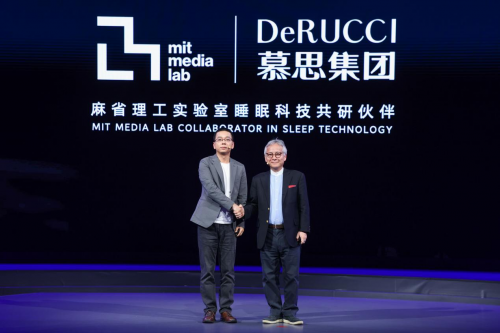
03. In the AI era, the sleep industry is undergoing major changes
In the era of artificial intelligence, the sleep industry is undergoing a profound and extensive change, shifting from a single product orientation to building an all-round, intelligent life scenario, striving for a high degree of integration between products and lifestyle. Just as mobile smart devices have profoundly changed our daily habits, AI technology is leading us into a new sleep era, meeting consumers’ urgent needs for quality sleep with precise and personalized solutions. Among them, integrating adaptive learning AI technology into mattresses is undoubtedly the inevitable product of the intersection of technological progress and market demand.
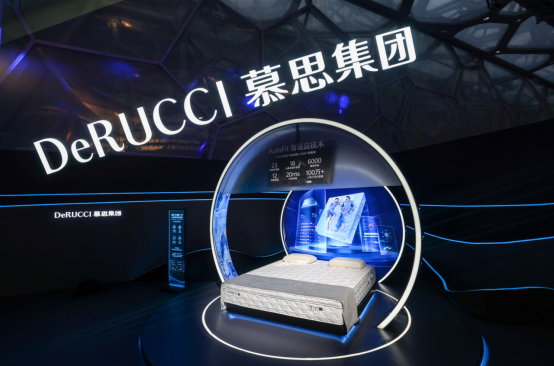
In the face of fierce market competition, creating sleep products with significantly differentiated features and refined usage scenarios has become the key for brands to stand out. China’s sleep industry explorers, represented by Muse Group, will play an irreplaceable role in the field of health management through in-depth exploration and extensive application of artificial intelligence technology. Imagine a scenario where a smart mattress monitors the user’s vital signs in real time, warns of potential health risks and achieves seamless integration with the medical system, making every sleep a comprehensive health management process. Doesn’t it feel like science fiction but it is indeed within reach? ?
Perhaps as Li Xiaofeng, vice president of Muse Group, said: “Future sleep technology will go beyond the hardware itself and focus more on providing personalized services through data, bringing revolutionary improvements to people’s health and quality of life.” This prediction is not only It reveals the future picture of the brand, and also points out the industrial trend in the era of artificial intelligence. The interaction between technological progress and market demand has a positive effect on improving industrial competitiveness and leading the industry into personalization and intelligence.
From a macro perspective, the rise of the smart sleep industry powered by AI technology is also an important implementation of new productivity in the sleep industry. It has far-reaching significance for promoting the development of the real economy and improving the health of the entire population.
[ad_2]
Source link


